
No. 3, 2025 | 28 February 2025
Go to:
From FRSA's Executive Director
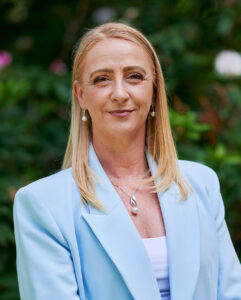
The shared learning experience of network events was alive and well in Canberra, Ngunnawal country, last week! The Child Inclusive Practice (CIP) Forum was a great success and it was wonderful to be immersed in the professionalism and passion of people in our sector dedicated to hearing the voices of children and young people and giving them life.
Early in the event we heard from the very astute and inspirational Professor Jenn McIntosh AM who spoke about working with infants – those aged 0-2. Not to oversimplify the subject and related practice – a message that resonated strongly with me was her outline of four things that children, even as infants, want from their parents/carers/family. They are: safety, security, repair and joy. Fast forward to the end of the event where we had an amazingly moving young person’s panel talking about their experiences of growing up with an array of complex and challenging issues. They were asked what they valued most and the things that made the greatest difference to them in their lives. Although not necessarily expressed in the exact same way as Jen, their conversation reflected that it was when they felt safe; they felt secure; they experienced relationships that were open to repair, and they were able to find joy/have fun.
We had an amazing array of keynotes, panels and concurrent session presentations and many of those (that we have permission to share) are now available on our website.

Before the CIP Forum I had the opportunity to visit BaptistCare’s HopeStreet precinct in the middle of Sydney at Woolloomooloo. My thanks to Robyn Evans and two of her team members – Jeffrey Taylor and Sam Stamnos – for sharing with me the work they do with their FRS funding and all the other services they offer to the HopeStreet precinct community and clients. My congratulations to Robyn Evans who was recently appointed as the Executive General Manager, of newly amalgamated Baptcare, Baptist Care SA, and BaptistCare.
Next week I embark on my FRSA Member Forums which are being held in the capital city of each state and territory. I am really looking forward to spending time with our Member delegates and senior staff over the coming month to share what I can about the state of play in the sector from the national perspective. Importantly, it also provides me with the privileged opportunity to hear about the key priorities, challenges and opportunities for members, as they see them, moving forward.
We have also just announced an extension to the early bird period for the FRSA Conference. This will now close on Monday, 17 March 2025. It will be great if we can make our Sydney Conference our biggest yet!
Kind regards,
Jackie Brady
FRSA Executive Director
Putting children at the centre: Highlights from the Child Inclusive Practice Forum 2025
FRSA was thrilled to hold our Child Inclusive Practice Forum – Children at the Centre – in Canberra last week. This two-day event attracted 175+ delegates from across the country who are committed to keeping the best interests of children at the forefront of Family Dispute Resolution (mediation) and child and family services.
Concurrent sessions on the program were organised across four themes – practice developments, complex clinical scenarios, management issues and research – offering a rich and diverse set of presentations and much food for thought.
The program also included four keynote presentations and two panel discussions. Keynote presentations included:
- Anne Hollonds, National Children’s Commissioner – Child Inclusion – a human rights perspective
- Professor Jennifer McIntosh AM, The Bouverie Centre – Transgenerational healing: Infant led family therapy
- Jon Graham & Lorri Yasenik, The International Centre for Children and Family Law – Parents’ Readiness to Hear Their Child’s Voice
- The Hon Deputy Chief Justice Robert McClelland AO, Federal Circuit and Family Court of Australia – On Children’s Voices.
Panel discussions included:
- Skills and Attributes for working with children – in pursuit of a definition or understanding of best practice in the family and relationship services sector
- What makes a difference when working with young people – a young people’s panel.
There were many highlights and takeaways across the two days. We were particularly struck by the reflections of the three panellists comprising the young people’s panel on their service experiences. What helped? Having someone who cared enough to follow through on their promises of support. What harmed? Being ‘dropped’ by a service because their circumstances were too complex or their support worker/counsellor left the organisation and there was no continuity in care. In the past year, there have been several reviews (or reviews are underway) of family and relationship services programs in both the Department of Social Services and Attorney-General’s Department portfolios. In each of these reviews, FRSA has highlighted the importance of funding case management (however loosely defined), to ensure that children, young people, adults and families accessing services are able to be supported in some way, even where the service first accessed is not the right intervention for them.
Thank you to our Gold Sponsor for the Forum, Uniting Counselling and Mediation.
If you were unable to attend the CIP Forum and are interested in learning more, many of our presenters have agreed to make their slides available. You can access them by clicking on the relevant session in the PDF program.
Additionally, all event photos are also now available via the website. If you would like a high-resolution copy of any image, please contact the FRSA team at communications@frsa.org.au.
Early Bird EXTENDED!
We’re excited to share that the Early Bird registration rates for the FRSA National Conference have been extended until Monday, 17 March 2025!
This is your chance to save up to $200 per person on registration fees—don’t miss out on this fantastic opportunity to attend the Conference at a discounted rate.
Take advantage of this offer before it expires and secure your spot today. We look forward to seeing you there!
Early Bird Registration Fee* EXTENDED TO 17 March 2025
| Member Rates | Non-Member Rates | |
| Complete Conference Experience – Including dinner | $1,095.00 | $1,395.00 |
| Conference Only – No dinner | $1,020.00 | $1,320.00 |
* To be entitled to the early bird registration fee you must have registered and paid by 17 March 2025.
Group Registrations
FRSA is pleased to offer FRSA Members the opportunity to register five (5) participants and receive the sixth registration complimentary. To be eligible for the complimentary registration, you must register your five (5) participants using the link below. Instructions on how to register your complimentary registration will be provided on the confirmation email. Interested in becoming an FRSA Member? Visit our Membership page.
Please note: When registering the 6 for 5, to receive the 6th registration free the same registration type must be purchased for the entire group.
Stay tuned for more announcements in the lead up to the Conference including Keynote speakers, panellists and more!
Pre-Conference Workshops
Pre-Conference Workshops will be held on Monday, 19 May 2025. This years’ National Conference will comprise four engaging workshops. We’re highlighting two of the workshops below. Stay tuned for more details on each workshop coming soon! Please note all Pre-Conference Workshops are for FRSA Members only.
Cultural Frameworks and Embedding Them into Professional Practice (Full Day)
Facilitator: Stuart McMinn, Gawura Cultural Immersions
This workshop introduces participants to cultural frameworks and epistemologies that have been integral to First Nations cultural practices for hundreds of thousands of years. It aims to equip practitioners with the knowledge and confidence to embed these concepts into their professional practice.
The session will be interactive, strengths-based, and focused on building confidence in applying good practices when working with First Nations people. Participants will explore concepts such as the “6Ls” developed by Paul Gordon, translated into a professional setting to enhance understanding of community engagement, therapeutic practice, cultural celebration, leadership, and community dynamics.
Survey success: Simplifying data collection for maximum impact (Half Day)
Presenters: Sharnee Moore, Kat Goldsworthy, Stephanie Beckwith, Australian Institute of Family Studies and Dr Mandy Charman, Centre for Excellence in Child and Family Welfare
This half-day workshop is designed specifically for program managers and practitioners who are currently using surveys or planning to integrate them into their programs and services.
The workshop will be highly interactive, featuring case studies, group discussions, and hands-on activities. Participants will leave with a toolkit of resources and actionable strategies to enhance their survey practices. By the end of the session, attendees will be equipped to implement surveys that not only meet reporting requirements but also contribute to continuous program improvement.
Gala Dinner Venue Announced
FRSA is excited to announce that the venue for the FRSA National Conference 2025 Gala Dinner is Doltone House Hyde Park.
Just steps away from the Conference venue, Doltone House echoes the architectural grandeur and cultural legacy of its previous life as an exclusive city club dating to 1858. Interiors by leading Sydney designer Koichi Takada reflect the elegance of a bygone era, an aesthetic echoed in the opulent decor of the grand Ballroom and contrasted against the contemporary New York chic of its more intimate meeting and eating spaces.
The evening will kick off at 7pm on Wednesday, 21 May 2025, with semi-formal attire. Attendees will be welcomed with drinks and canapés on arrival.
Please ensure you select a registration that includes dinner. Additional tickets are available for purchase for $195.
It promises to be an unforgettable evening at the FRSA Gala Dinner!

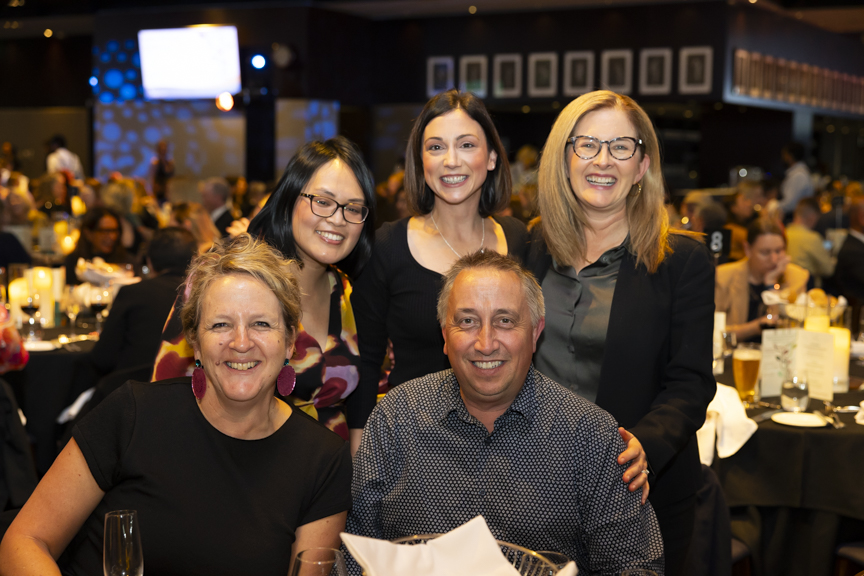

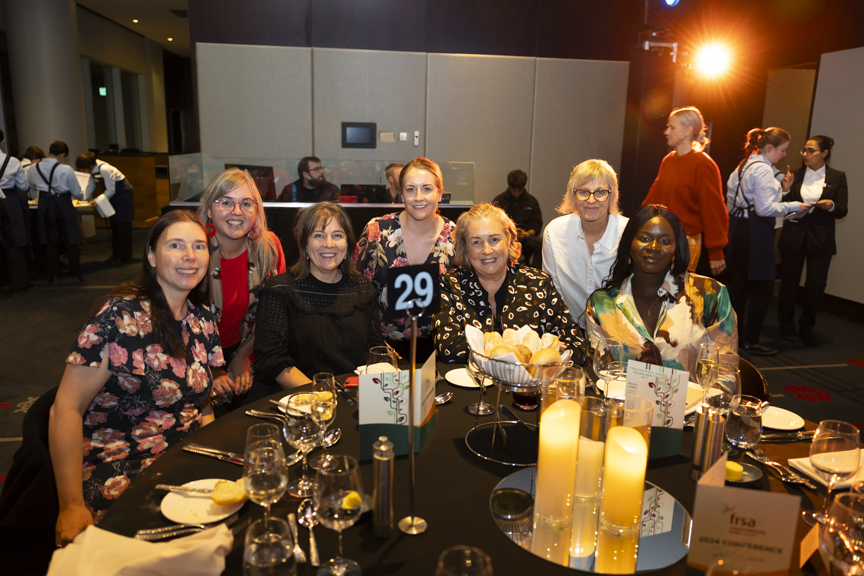

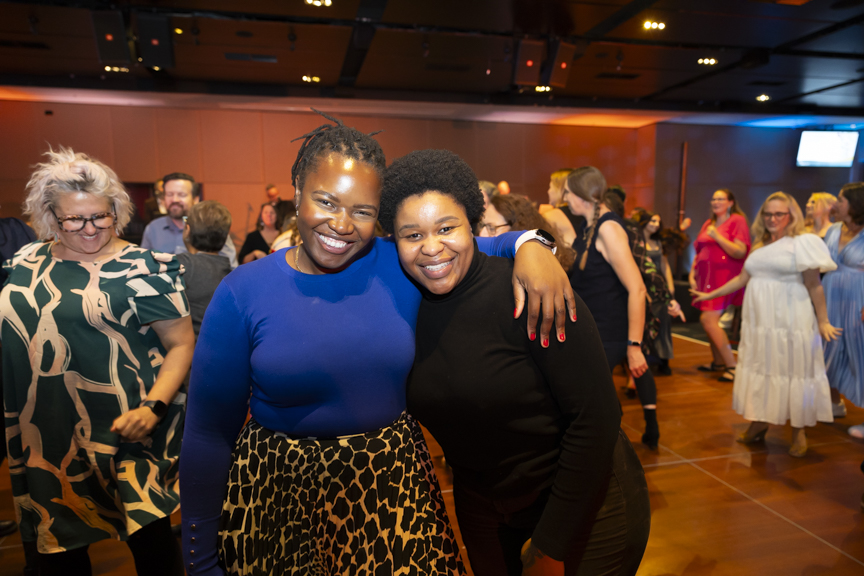
Bursary Program
Two bursaries are available for Aboriginal and Torres Strait Islander people who are registered for or would like to attend the 2025 Family & Relationship Services Australia National Conference.
Bursaries are provided to assist with covering the cost of conference registration, and travel & accommodation. To be eligible you must be an employee of a fully financial FRSA member organisation. Each package includes:
- 1 x Complimentary full registration to the Conference (including dinner)
- $500 towards travel and accommodation
Applications closes on FRIDAY, 28 March 2025.

Social Justice Stocktake 2025
 Last week the Salvation Army released their second Social Justice Stocktake revealing the concerns of Australians by nation, state/territories, and individual electorates.
Last week the Salvation Army released their second Social Justice Stocktake revealing the concerns of Australians by nation, state/territories, and individual electorates.
The Salvation Army’s National Social Justice Stocktake Reports (NSJSR) were released online via – www.salvationarmy.org.au/socialjusticestocktake allowing everyday Australians, policy makers and politicians on a local, state and federal level to ascertain issues impacting individuals and their communities – and how these issues will affect voting in the federal election.
More than 16,000 people from all demographics across every state and territory contributed to the NSJSR via a survey, with this information compiled into 160 individual reports consisting of each federal electorate, state and territory and one big report for all of Australia. The Reports cover a range of issues, for example:
- Aboriginal and Torres Strait Islander disadvantage
- Disability discrimination and hardship
- Family violence
- Gender inequality and inequity
- Housing affordability
- Mental health
- Poverty and financial hardship
- Social isolation and loneliness
National suicide prevention strategy 2025–2035
 Last week the Government released the National Suicide Prevention Strategy 2025–2035.
Last week the Government released the National Suicide Prevention Strategy 2025–2035.
The Strategy outlines what is required to provide a national, evidence-based and compassionate suicide prevention system. It aims to prevent suicide by addressing the circumstances that lead to suicidal distress and to support people experiencing suicidal thoughts and those who care for them.
Drawing on the latest research, evidence and insights from people with lived and living experience of suicide, the strategy outlines a comprehensive approach to suicide prevention. It aims to unify the efforts of governments, communities and service providers to improve suicide prevention outcomes. The strategy is organised into three domains:
- Prevention of suicidal distress describes what is required to reduce the likelihood of suicidal distress arising. This involves strengthening the wellbeing of communities and better supporting those who are struggling with factors we know can lead to suicidal distress.
- Support for people experiencing suicidal thoughts and behaviours and those who care for them describes the elements required for an effective support system. To provide high-quality support, these components must operate in each part of the support system and across the system as a whole.
- Critical enablers are the administrative and structural elements that must be present to achieve the objectives of the Prevention and Support domains.

Family Law (Superannuation Regulations 2025)
On 20 February 2025, the Governor-General in Council made the Family Law (Superannuation) Regulations 2025 . The 2025 Regulations will replace the Family Law (Superannuation) Regulations 2001 and commence on 1 April 2025.
The 2025 Regulations support the operation of Parts VIIB and VIIC of the Family Law Act 1975 with respect to the splitting of superannuation assets of separated couples. Like the 2001 Regulations, the 2025 Regulations enable trustees to share information about superannuation interests, provide formulae to value interests for family law purposes, and give practical effect to superannuation splitting orders and agreements.
The key changes that have been incorporated into the 2025 Regulations relate to:
- Updating the ‘default’ methods and factors used for valuing certain superannuation interests, including updates to the demographic and economic assumptions which underpin these methods and factors.
- Ensuring innovative retirement income stream products are captured consistently with other superannuation interests for family law purposes.
- Clarifying key terms used in the Regulations including ‘base amount’ and ‘component of a superannuation interest’.
- Introducing flexibility to the way a non-member spouse provides information to a trustee following the making of a superannuation splitting order or agreement.
- Expanding the types of superannuation interests for which the Minister may approve valuation methods and factors.
- Introducing a transition factor to mitigate any unintended consequences of the 2025 Regulations on superannuation orders or agreements made before 1 April 2025.
- Minor and technical amendments to ensure consistency throughout the Regulations.
These changes follow public consultation on an exposure draft of the Family Law (Superannuation) Regulations 2025 in March-April 2024.
Family Law Changes from June 2025 – information for family law professionals
The Attorney-General’s Department has published information for family law professionals outlining the changes to the Family Law Act 1975 in the Family law Amendment Act 2024 on its website.
The changes focus on the financial and property aspects of relationship breakdown. They also impact other areas of the Family Law Act, including:
- children’s contact services
- case management of divorces and family dispute resolution (FDR)
- protecting sensitive information.
The information for family law professionals summarises each schedule of the Amendment Act. It covers:
- how the changes will apply
- when certain measures come into force, including to proceedings underway but not finalised.
The department has also published an Easy Read version into 11 languages of the ‘Family law (property) changes from 10 June 2025: fact sheet for separating couples’.
Appointments to the Family Law Council
On 26 February the Attorney-General, the Hon Mark Dreyfus, announced the appointment of eleven members to the Family Law Council, including FRSA Board member, Judge Alexandra Harland.
The Council is established under the Family Law Act 1975, and is an independent body that provides expert advice to the Attorney-General on complex family law issues.
There are a number of changes in the Council membership with another notable mention in the new appointees being from one of our member organisations, Mr Nick Tebbey, CEO of Relationships Australia.
Members who have been re-appointed to the Council include The Hon Justice Jacoba Brasch (Chair), Dr Rachel Carson, the Hon John Faulks, Judge Alexandra Harland and Ms Julie Jackson.
The newly appointed members include Ms Antoinette Braybrook, Ms Philippa Davis, Ms Zoe Rathus, Ms Anne-Marie Rice, Mr Nick Tebbey and Mr Glenn Thompson. The Hon Justice Richard O’Brien of the Family Court of Western Australia also continues his three-year term on the Council, following his appointment on 7 March 2024.
FRSA acknowledges the work of the outgoing Chair, the Hon Deputy Chief Justice of the Federal Circuit and Family Court of Australia, Robert McClelland AO and other outgoing members, Ms Anne Hollonds, Ms Michelle Hayward, Dr Andrew Bickerdike, Ms Virginia Wilson, the Hon Justice Richard O’Brien and Dr Rae Kaspiew.
We await further advice on the status of observers in this next term of the Family Law Council.
Funding Announcements
Free Digital Mental Health Supports
The Australian Government has announced a $135.2 million investment in the Digital Mental Health Program. Twelve mental health services aim to provide equal access to digital and online mental health support.
Programs include a digital mental health service for culturally and linguistically diverse communities, and a national online treatment program for new fathers who are experiencing depression.
Helping First Nations women and children leave violent relationships
The Australian Government has announced it is supporting First Nations women and children living in Broome, WA, to leave violent family relationships.
Broome Regional Aboriginal Medical Service has received $7 million in funding to deliver the West Kimberley Leaving Violence Network, significantly expanding the immediate supports available for Aboriginal and Torres Strait Islander victim-survivors.
This is one of three regional place-based trials commencing from 1 July – complementing the next stage of the $925 million Leaving Violence Program.
The Government is investing $22.35 million in trials in Broome, Dubbo in NSW and Darwin in the Northern Territory, to provide tailored, trauma-informed support to Aboriginal and Torres Strait Islander peoples.

Elder Abuse Action Alliance Lunch & Learn
Elder Abuse Action Alliance are holding an online Lunch & Learn session presented by UnitingCare’s Research Officer – Family & Disability Services, Anna Gillbard on 13 March 2025 at 12:30-1:30pm AEDT.
Her presentation is titled ‘Beyond the numbers: how gender shapes the experience of elder abuse’. In this session, she will be sharing the findings of her research that investigated whether risk factors, the nature of the abuse and barriers to change differed as a function of victim gender.
CatholicCare Wollongong wins AIIP Award
 CatholicCare Wollongong has been named the winners of the 2025 Australian Institute for Intergenerational Practice (AIIP) Award for outstanding Intergenerational practice for their Cross+Gen program.
CatholicCare Wollongong has been named the winners of the 2025 Australian Institute for Intergenerational Practice (AIIP) Award for outstanding Intergenerational practice for their Cross+Gen program.
The Cross+Gen program is a collaboration between CatholicCare Wollongong, Catholic Education Diocese of Wollongong, and the Catholic Diocese of Wollongong, to improve older Australian’s digital literacy by bringing them together with high school students, fostering deep, human connections across generations.
The AIIP is a peak body established to advance evidence-based intergenerational activities.
Congratulations CatholicCare Wollongong!
CSSA National Conference: Hope in Action.
 Catholic Social Services Australia (CSSA) are holding their National Conference on 19-20 March 2025 at the Commonwealth Bank Head Office, 11 Harbour Street, Darling Harbour, Sydney.
Catholic Social Services Australia (CSSA) are holding their National Conference on 19-20 March 2025 at the Commonwealth Bank Head Office, 11 Harbour Street, Darling Harbour, Sydney.
Inspired by the Catholic Church’s 2025 Jubilee, this landmark event will bring together Catholic religious leaders, academics, practitioners, and advocates from across Australia to highlight “Hope in Action,” a theme rooted in Catholic Social Teaching which is dedicated to advancing human dignity and the common good.
The Conference will shine the light on pressing social problems, including child poverty, homelessness, family, and domestic violence – conditions often deeply connected to cycles of poverty and systemic inequality.
A highlight will be the unveiling of a research report: Real Costs, Real Impacts: A Path to Community Services Sustainability by Prof David Gilchrist from the University of Western Australia Centre for Public Value. Click here to find out more or to register.
UnitingSA - Communities for Children FP videos
Uniting SA’s Communities for Children FP (CfC FP) team has created two new videos promoting their CfC model in the Adelaide western metro area. They aimed to highlight this important work particularly in terms of:
- Working collaboratively with First Nations peoples and partnering with ACCOs, and
- Services and programs available for multicultural communities.
Watch the videos below:

Survey extended: Towards an Australian Response to the use of Intimate Partner Violence by Young People
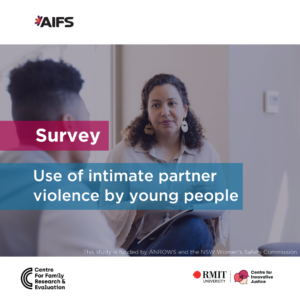 The Australian Institute of Family Studies (AIFS) has extended the closing date until 9 March 2025 for the survey on the use of intimate partner violence by young people.
The Australian Institute of Family Studies (AIFS) has extended the closing date until 9 March 2025 for the survey on the use of intimate partner violence by young people.
This project aims to build understanding of the extent to which young people’s use of intimate partner violence (IPV) can be understood as distinct from adult-perpetrated violence, and how services and agencies across Australia are responding to this cohort.
Read the participant information sheet and/or complete the survey.
Bridging Now to Next – Get ready for #NRW2025
 Get ready for National Reconciliation Week (NRW) 2025 with posters, social media tiles and other information now available to download from the Reconciliation Australia website.
Get ready for National Reconciliation Week (NRW) 2025 with posters, social media tiles and other information now available to download from the Reconciliation Australia website.
The week is on from 27 May – 3 June and this year’s theme is Bridging Now to Next. It urges us to look ahead and continue the push forward as past lessons guide us.
The #NRW2025 artwork was created by Kalkadoon woman Bree Buttenshaw, and features native plants − known for regenerating after fire and thriving through adversity − as a symbol of our collective strength and the possibilities of renewal.
Click here to download the posters, online assests and resources. Display them, sharing the theme on social media, and making plans for how you can use the theme and resources to celebrate the week in your communities.
Me/We campaign from Our Watch
 The second phase of OurWatch’s Me/We (Change the story) campaign is live. The campaign aims to help more people in Australia understand the link between gender inequality and violence against women, so together we can change the story.
The second phase of OurWatch’s Me/We (Change the story) campaign is live. The campaign aims to help more people in Australia understand the link between gender inequality and violence against women, so together we can change the story.
Our Watch is calling on all of Australia to take collective responsibility for changing these behaviours and ensuring a safer, more equal society.
Please help support this campaign by sharing the campaign content across your own social media channels, internal communications and with your partners.
Find out more at ourwatch.org.au/mewe and/or download the campaign material here.
Who supports you to raise your children? Research interviews
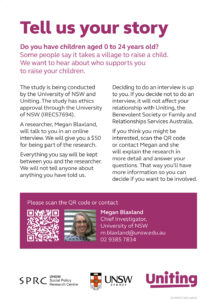 The University of NSW and Uniting are conducting a study about the supports people receive to raise their children and are seeking interview participants to tell their story. All interviews will be confidential and participants will receive $50 for being part of the research.
The University of NSW and Uniting are conducting a study about the supports people receive to raise their children and are seeking interview participants to tell their story. All interviews will be confidential and participants will receive $50 for being part of the research.
You can find out more here.
SUNSHINE CIRCLES – Albury
SUNSHINE CIRCLES – Shepparton
HEY LITTLE WARRIOR – Sale
A DEVELOPING BRAIN – Sale
NT
Family & Relationship Counsellor | Anglicare NT
Financial Capability Worker | Anglicare NT
NSW
Family Dispute Resolution Practitioner & General Mediator | Interrelate
Manager School Wellbeing Program | Centacare Central West and Orana
Couple & Family Counsellor | Relationships Australia NSW
VIC
Family Dispute Resolution Practitioner | EACH
Policy & Advocacy Assistant | Better Place Australia
If you have any events you’d like listed on the FRSA Events and Training Calendar or job vacancies you’d like listed on the FRSA Jobs Board, email Communications Officer, Vanessa Lam at communications@frsa.org.au. Please note that posting onto the FRSA website is reserved for FRSA Members only.

Cost-of-living and the climate crisis | The Australia Institute
 The report finds direct connections between the climate crisis and rising cost-of-living pressures. It posits that failure to lower emissions now will only aggravate the crisis, with each moment of inaction compounding the pressure on households. Three key areas are identified where the climate crisis is directly driving up costs: insurance, food and energy.
The report finds direct connections between the climate crisis and rising cost-of-living pressures. It posits that failure to lower emissions now will only aggravate the crisis, with each moment of inaction compounding the pressure on households. Three key areas are identified where the climate crisis is directly driving up costs: insurance, food and energy.
Are you waiting for us to die? The unfinished business of Bringing Them Home | Healing Foundation
 A new Healing Foundation report has found only 6% of the Bringing them home report recommendations – made to support Stolen Generations survivors and their families almost 28 years ago – have been clearly implemented.
A new Healing Foundation report has found only 6% of the Bringing them home report recommendations – made to support Stolen Generations survivors and their families almost 28 years ago – have been clearly implemented.
It recommends a National Healing Package of priority changes to enable remaining elderly survivors to live out their days with dignity. The title of the new report reflects the collective testimony of Stolen Generation survivors, who are seeing their brothers and sisters passing away, and the urgency of the changes that are sought.
Why meaningful participation for children in out-of-home care is essential | Emerging Minds
This short article aims to raise awareness of the importance of meaningful child participation in the context of out-of-home care (OOHC). It outlines why practitioners should support children in OOHC to participate in decisions that affect their lives, and why this participation is central to respecting children’s rights and supporting their wellbeing.
National roadmap to improve the health and mental health of Autistic people 2025–2035 | Department of Health and Aged Care
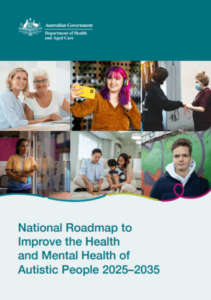 This roadmap aims to address the breadth of issues faced by Autistic people in the Australian healthcare system. It outlines the path to improve the physical and mental health of Australia’s growing Autistic population.
This roadmap aims to address the breadth of issues faced by Autistic people in the Australian healthcare system. It outlines the path to improve the physical and mental health of Australia’s growing Autistic population.
Children and young people in residential care: statistical report | Department of Communities and Justice (NSW)
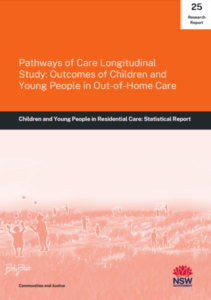 This report focuses the demographic characteristics, socio-emotional wellbeing, social competence, verbal ability, non-verbal reasoning and the perspectives of the children and young people in residential care.
This report focuses the demographic characteristics, socio-emotional wellbeing, social competence, verbal ability, non-verbal reasoning and the perspectives of the children and young people in residential care.
Investigation report: support when children are sexually abused at school | Victorian Ombudsman
 An investigation into complaints about how the Victorian Department of Education and a government primary school responded to allegations of sexual abuse of two children. It found that the Department’s response to the allegations and disclosures of sexual abuse at the time was inadequate, and in some respects seriously so.
An investigation into complaints about how the Victorian Department of Education and a government primary school responded to allegations of sexual abuse of two children. It found that the Department’s response to the allegations and disclosures of sexual abuse at the time was inadequate, and in some respects seriously so.
Under pressure: Everybody’s Home sector survey | Everybody’s Home
The survey captures the perspectives of organisations operating across multiple service sectors, including homelessness, domestic and family violence support, financial counselling and emergency relief. Their insights paint a concerning picture of a system under strain, where rising costs and a lack of affordable housing are creating insurmountable barriers for vulnerable people.
Behind the screen: the reality of age assurance and social media access for young Australians | eSafety Commissioner
 This report examines age assurance measures on social media platforms used by young Australians. It combines regulatory data from social media services with survey responses from Australian children to assess the effectiveness of age restrictions. It finds inconsistent policies and an overall lack of robust interventions are failing to keep children off social media.
This report examines age assurance measures on social media platforms used by young Australians. It combines regulatory data from social media services with survey responses from Australian children to assess the effectiveness of age restrictions. It finds inconsistent policies and an overall lack of robust interventions are failing to keep children off social media.
Effective parenting programs: What does the evidence say? | Australian Institute of Family Studies
 This report summarises the evidence on the effectiveness of parenting programs, which populations they can support and when they can be effective. It finds the evidence for which specific components make programs effective is currently ambiguous, but that parenting programs overall can be effective for both general and specific populations.
This report summarises the evidence on the effectiveness of parenting programs, which populations they can support and when they can be effective. It finds the evidence for which specific components make programs effective is currently ambiguous, but that parenting programs overall can be effective for both general and specific populations.
Responding to children and young people’s disclosures of abuse | Child Family Community Australia
Child abuse and maltreatment are associated with severe mental health problems and behavioural harms, both in childhood and adulthood. This guide looks at responding to children and young people’s disclosures of abuse and maltreatment and outlines what we know about how, why and when children and young people are likely to disclose abuse. It provides information to help individuals respond to these disclosures.
 This evidence brief provides a summary of the literature on men’s behaviour change programs (MBCPs), focusing primarily on their role in addressing domestic, family and sexual violence in Australia. There is now a growing appreciation and understanding that MBCPs are one piece of the puzzle in a wider system of accountability for people who use violence.
This evidence brief provides a summary of the literature on men’s behaviour change programs (MBCPs), focusing primarily on their role in addressing domestic, family and sexual violence in Australia. There is now a growing appreciation and understanding that MBCPs are one piece of the puzzle in a wider system of accountability for people who use violence.
Australian charities state of the sector report | Community Council for Australia
A scorecard assessing the effectiveness of government commitments to the charity sector. It captures insights into the sector’s confidence, government policy successes and areas requiring improvement. It reveals significant failures, providing an adverse assessment on the federal government’s failure to ease the burden on organisations that are delivering urgent cost of living help.
Want to submit something to the FRSA eBulletin?
If you have an news item or event that you would like to be featured in a future eBulletin please submit your announcement via the form below or email communications@frsa.org.au with the subject “FRSA eBulletin submission”.
Please note FRSA members receive priority for items posted in the eBulletin. And to keep information current, relevant and useful, submissions will not be repeated from week to week.
Subscribe
Subscribe to receive future eBulletin editions directly to your inbox!










